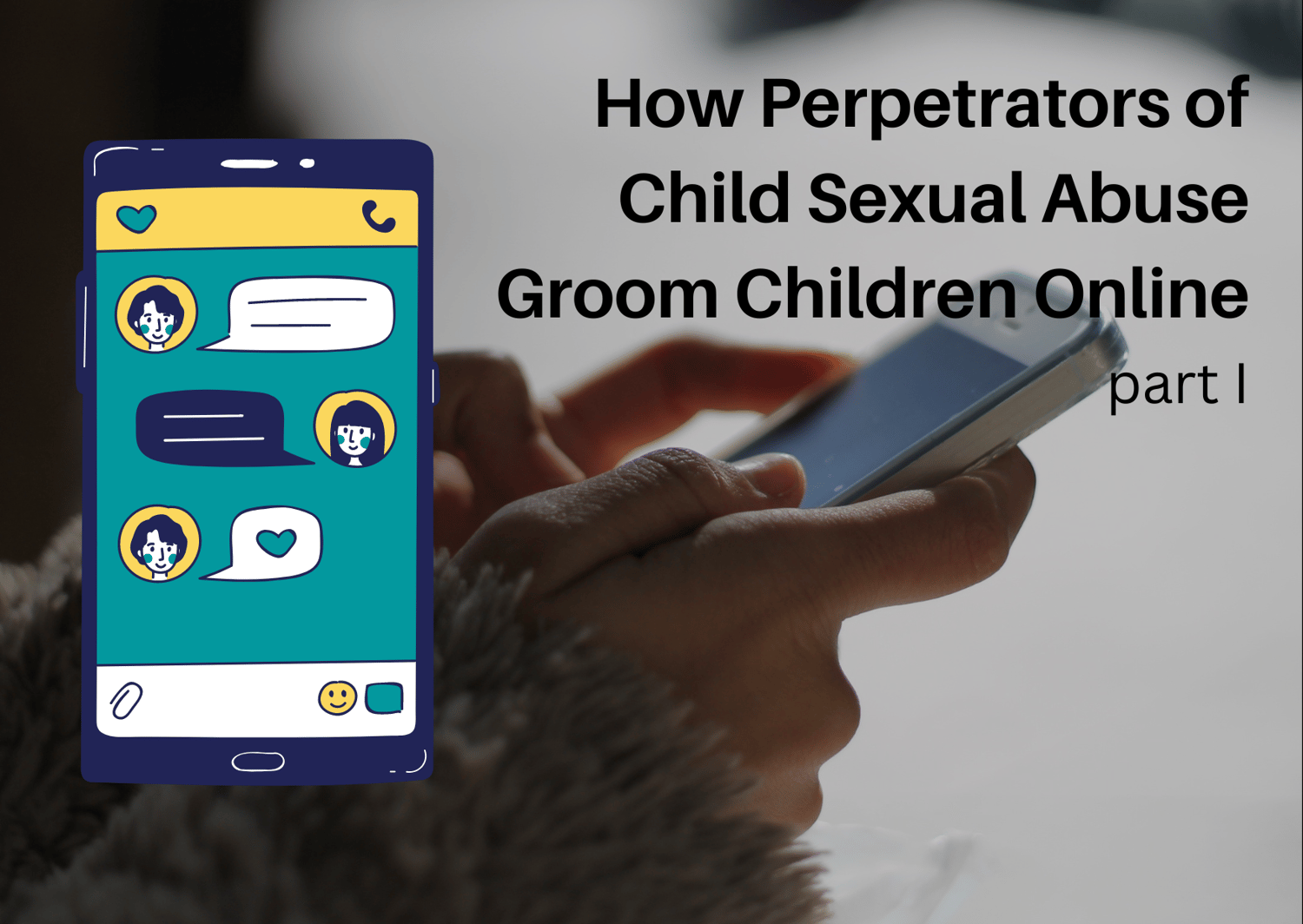What is Online Grooming?
Before jumping onto what online grooming, let us get to know what grooming in general is. Grooming is when an adult forges a relationship with a child by fulfilling a need in the child's life or taking advantage of a kid's vulnerabilities. This is a process that can happens over a period of time to ultimately exploit children through sexual abuse, sexual exploitation, or trafficking. Grooming can happen in two ways either in person or through online means. Not to mention, children can be groomed by anyone they know, family members, or strangers of any age or gender. After a period of time, the groomer (victim) perpetrator normalizes sexual and intimate conversation thus making it acceptable to take actions they normally would not.
Where Does Online Grooming Happens
Online grooming can happen on any online platform such as social media, gaming sites, or any site that allows individuals to communicate with one another. Since this kind of grooming happens online, it can be difficult to recognize for parents.
Try thinking about grooming, specifically online grooming, as a long game. Perpetrators will take time to build trust and a relationship with your child. It is a gradual process of coercion and manipulation.
How Perpetrators Groom Children Online
- Recognizing and targeting the child
Any child or teen can be a potential victim. perpetrator s find their victims through social networking, blogs, chat rooms (even monitored, kids chat rooms), instant messaging, e-mail, and other Web sites, often using information in their targets’ personal profiles. Some perpetrator s may be attracted to specific children and youth with certain characteristics or may target youth with certain co-existing factors—those who are needy, unhappy, unable to talk about abuse, or have less parental oversight—to facilitate the crime.
- Getting the trust and access to the child's life
The perpetrator may observe your child and assess his/her vulnerabilities to learn how best to approach and interact with your child. Perpetrators may offer the child special attention, understanding and a sympathetic ear, and then engage your child in ways that eventually gain their friendship and trust (they may play games with victims or give them rides, provide them with gifts and/or special treats). They may offer an extra life for the character in a game, or offer them a listening space the child might be craving or validate their feelings that they might be seeking validation for.
Thus, through attention, flattery, affection, kindness, and even gifts. These types of manipulation might cause your kids to lose their sense of awareness, and this is what helps the perpetrators to get closure to their bad intentions of sexual exploitation. Feelings of love and exclusiveness are expressed by the perpetrator . They will say things like, “You are a sweetheart,” or “You are so cute when you look like that,” or “I feel a deep connection with you I don’t feel with anyone else.” Similar strong compliments are given by the perpetrators.
- Playing a significant person in the child’s life.
The perpetrator may try to manipulate the relationship so that it appears they are the only one who fully understands the child or meets the child’s needs in a particular way or vice versa. A perpetrator may also exploit a youth’s empathy and convince the young person that he or she is the only one who understands the perpetrator and reinforce that the perpetrator “needs” the child or youth.
- Isolating the child from their family and friends
Constantly being in touch and offering your child favors and validation like trips to amusement parks, offers to tutor your child for free, and other similar situations may signify that your child is being groomed. This is one way that the perpetrator may separate your child from others and gain access to the child alone, so that others cannot witness the abuse if they are able to meet the child in person. If the correspondence is purely online the perpetrator might keep the child engaged on chat by talking about things the child likes, complementing them. And eventually perpetrator might ingest feelings of hate in the mind of child against their parents and friends by manipulating the child into thinking that the parents and friends are not loving the child as much as they deserve
- Manipulating the child into maintaining the secrecy of their relationship.
The perpetrator may reinforce the special connection with the victim by coming across as a person who is always there for them and on their team. They would subtly start to demand favors in exchange of favors they made for the child and the first favor usually is to keep their relationship a secret from everybody including their parents. The perpetrator will ask questions like, “Are your parents around?” and “Who else uses the computer?” or “Can you delete your chats?” and “Do your parents monitor your online accounts?”
The perpetrator may threaten the victim with disclosure, suicide, physical harm to the child or loved ones, or other traumas if he or she had told.
- Initiating sexual contact.
It can begin with simple requests like asking the child to send a picture of their notebook or their thumb that seem like normal and non harmful requests to make and to fulfill. These requests would then gradually condition the child to obey the perpetrator, these requests will also gradually turn sexual in nature. If the perpetrator and the child live in the same city or area, the perpetrator might also ask the child to come meet them. This can also happen in a way where the child is gradually eased into meeting at a place where sexual activity can happen by first asking to meet at a known and non secluded place as per the child’s convenience. And then gradually taking the child to a place where sexual exploitation can be done
It may begin with asking questions like "Are you a virgin?" or will talk about other things that revolves around the similar lines in order to desensitize to them the language and content and then gradually touching that is not overtly sexual (though a perpetrator may find it sexually gratifying) and that may appear to be casual (arm around the shoulder, pat on the knee, etc.). Gradually, the perpetrator may introduce more sexualized touching. By breaking down inhibitions and desensitizing your child, the perpetrator can begin overtly touching your child.
- Controlling the relationship.
Perpetrators rely on the secrecy of the relationship to keep it going, and try to ensure that the child does not reveal the abuse. Children are often afraid of disclosing the abuse as they may have been told that they will not be believed, or that something about the child “makes” the abuser do this to them. The child may also feel shame, or fear that they will be blamed. Often, the perpetrator threatens your child to ensure that he or she won’t disclose the abuse.
Catphishing - A sophisticated way of grooming children online
Catphishing is when an individual presents false information about themselves online to lure someone into entering some kind of relationship. Older people who are perpetrators usually pretend to be a younger person or somebody of the same age as the child they are preying on to get closer to that child. This kind of perpetrator may use the same language as the child, would pretend to like the same things and have the same interests as the child to establish a common ground for building a connection and gain their trust. They would then go ahead to ask favors that turn sexual in nature, and once the child gives in to the demand and this catphish has some material (intimate conversations or images of child) they would then reveal their real identity and threaten them either to manipulate them to continue giving in to demands or to receive further favors from the child.
The Numbers
There are an estimated 500,000 online perpetrators active each day. Children between the ages of 12 and 15 are especially susceptible to be groomed or manipulated by adults they meet online. According to the F.B.I., over 50 percent of the victims of online sexual exploitation are between the ages of 12 and 15. An estimated 89 percent of sexual advances directed at children occur in Internet chatrooms or through instant messaging.
Read Ahead, Know More
You might definitely be curious to know more about how these perpetrators groom children online and how you can identify if your child is being groomed online. Read the part two of this article 12 Signs in Children That Could Hint They Are Being Groomed Online
and Part three of this article 10 Ways in Which Parents Can Keep Children Safe From Online Grooming



Comments ()